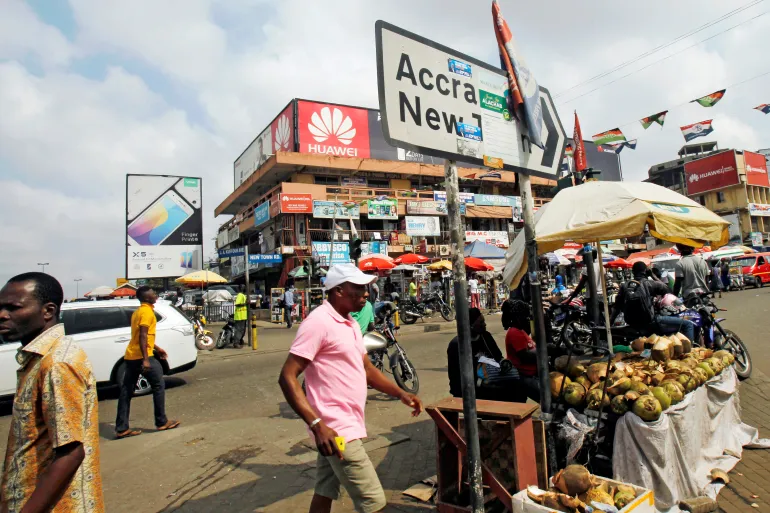- Ghana’s economy is showing signs of stabilization, which is attributable to the authorities’ steadfast rollout of its IMF-supported economic program.
- The country’s crises were a result of preexisting vulnerabilities and substantial external shocks.
- Two years ago, elevated fiscal deficits and public debt levels, together with the combined effects of the COVID-19 pandemic, Russia’s war in Ukraine, and global monetary policy tightening, hit the country hard.
Renewed optimism for Ghana’s economy
The International Monetary Fund (IMF) has expressed optimism that Ghana is currently making essential inroads to stabilize its economy as continued program implementation beckons a brighter future.
This after the economy suffered a substantial economic and financial crisis in the better part of 2022 that made the cocoa and gold producers request the IMF support programme.
“Ghana’s crises were as a result of preexisting vulnerabilities and substantial external shocks,” the lender says.
“Two years ago, elevated fiscal deficits and public debt levels, together with the combined effects of the COVID-19 pandemic, Russia’s war in Ukraine, and global monetary policy tightening, triggered a drop in international investor confidence in Ghana, resulting in a loss of international market access.”
It says the confluence of these issues generated increasing pressures on domestic financing, with the government turning to monetary financing by the central bank, which fed into declining international reserves, currency depreciation, and accelerating inflation.
However, it now says the country’s economy is showing signs of stabilization, thanks to the authorities’ steadfast implementation of its IMF-supported economic program.
Read also: Ghana maintains key interest rate at 29.5% to tackle inflation
Policy reform commitment under the programme
The programme, approved by the IMF Board in May 2023, was initially intended to restore macroeconomic stability, secure debt sustainability, and lay the foundations for higher and more inclusive growth.
The lender says the Ghanaian authorities have been taking bold steps to restore macroeconomic stability, including through their budgets for 2023 and 2024, which emphasize fiscal consolidation and sound public finances.
Alongside this, the Bank of Ghana has appropriately increased interest rates and eliminated monetary financing of the budget.
Although inflation remains high, it is headed in the right direction: down to 23 percent in December 2023 from a record high of 54 percent in December 2022, IMF says in part.
While the authorities’ fiscal efforts will be instrumental in ensuring long-term debt sustainability, the IMF also applauds the government for its initiative to launch a comprehensive debt restructuring operation in December 2022.
“This included a domestic debt voluntary exchange, which has been successfully concluded, and two external debt operations, one with official bilateral creditors and the other with commercial creditors,” it says.
Signs of stabilisation
Despite a challenging global economic environment, the IMF says the state’s growth in 2023 has shown resilience.
Alongside this and the significant decline in inflation, the currency has also recovered from its sharp depreciation (by 45 percent vis-à-vis the US dollar) at the end of 2022. It has been less volatile, with international reserves increasing, it adds in part.
It attributes this to the steadfast policy implementation around aligning the budget with the programme, and meeting its targets, primarily net international reserve accumulation and primary fiscal balance.
Considering the social impact of the programme and its impact on supporting the vulnerable, the lender says in 2023, Ghana doubled the benefits under the existing targeted cash transfer program, the Living Empowerment Against Poverty, and the benefits are expected to be doubled again in 2024.
“We foresee an increase in benefit coverage from about 6 percent to 12 percent (of household pre-transfer consumption), and helping to significantly reduce poverty and inequality.”
Ghana’s path forward
IMF advises that looking ahead, Ghana has to lock in the gains so far and continue steadfast implementation of the program.
This is despite challenges associated with potential external shocks and the political environment in the run-up to the 2024 Presidential and parliamentary elections.
“Sound policies are expected to foster the recovery, bringing economic growth back to long-term potential and protecting the vulnerable, while inflation is projected to decline further,” IMF says.
“If the authorities continue to implement their package of policies and reforms with the commitment and drive demonstrated so far, sustained implementation of the program promises to bring a brighter future to all Ghanaians.”
Read also: Crisis-saddled Ghanaian fintech Dash exits the market
